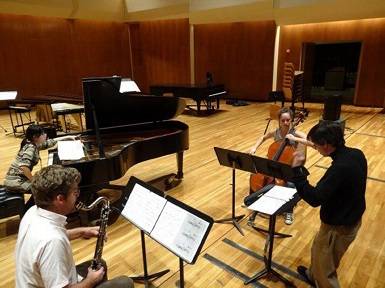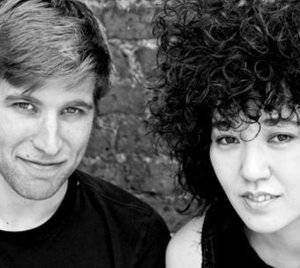The Illinois Modern Ensemble upholds a respectable commitment to performing contemporary and experimental works with great talent. On Wednesday evening, the Illinois Modern Ensemble will contribute to Sonic Illinois, the month-long celebration of new music, with a revised program entitled United in Protest. The program consists of works of 20th century composers John Cage and Terry Riley as well as compositions from the School of Music faculty. It is these contemporary works which continue to introduce new ideas and push the boundaries in musical aesthetic, and that is what makes them so important to the intellectual progression of musical ideas.
Ahead of the performance, I spoke with Dr. Stephen Taylor, the co-director of the Illinois Modern Ensemble, and he shared his excitement for Sonic Illinois and for the ensemble’s upcoming performance. The program change was a rather sudden development influenced by the cancellation of the performance which was supposed to take place on Tuesday night, featuring the duo of violinist Aisha Orazbayeva and pianist Joseph Houston. The decision to cancel this performance, and all of their upcoming U.S. dates, was made in solidarity after the recent U.S. executive order on immigration. Taylor tells me that Orazbayeva, who was born in the majority Muslim country of Kazakhstan, knew she could not, in good conscience, go through with the performance. “Music is a force for bringing people together,” Taylor says, “and if people are not allowed to come together to play because of things like this ban, then that is sad. So we have to make the best of it.”

Aisha Orazbayeva and Joseph Houston.
The new program, United in Protest, will begin with compositions by the School of Music’s faculty members. The first piece is “Cold Horizon” by Reynold Tharp. The second piece is “Memos” by Erik Lund and will feature the Jupiter String Quartet. The third piece is John Cage’s “Concert for Piano and Orchestra” (with guest conductor Will Sugg) and will be preceded by a reading of Cage’s “Lecture on the Weather” read by Taylor’s retired colleague Professor Bill Brooks. Taylor mentions, “Cage was a very striking philosopher and he would have had a lot to say about the current political situation, so I’m glad that we’re going to be able to put some of his words in there as well as his music.” This piece was originally going to feature Joseph Houston on the piano. Taylor tells me that Cage is also a “big believe in randomness and chance,” so the orchestra to perform this piece can have any number of players and the piano part is actually optional. In light of Houston’s absence, they will perform the piece without a pianist, but keep the instrument on stage with nobody playing it.
 The final piece of the program was going to feature a violin solo by Aisha Orazbayeva. As a replacement, Erik Lund proposed the idea to perform “In C” by Terry Riley. This is a piece composed of many small melodic fragments which can be performed by any number of players on any instrument. Interestingly, you do not have to be able to read music to play this piece, and anyone who wishes to participate is encouraged to bring an instrument or simply any kind of noise maker. The hope is that the entire audience will come on stage and participate in the performance of this final piece in a statement of togetherness. There will be plenty of instruments available for those who can read music, such as pianos, marimbas, and vibraphones, and percussion instruments for those who are not musicians.
The final piece of the program was going to feature a violin solo by Aisha Orazbayeva. As a replacement, Erik Lund proposed the idea to perform “In C” by Terry Riley. This is a piece composed of many small melodic fragments which can be performed by any number of players on any instrument. Interestingly, you do not have to be able to read music to play this piece, and anyone who wishes to participate is encouraged to bring an instrument or simply any kind of noise maker. The hope is that the entire audience will come on stage and participate in the performance of this final piece in a statement of togetherness. There will be plenty of instruments available for those who can read music, such as pianos, marimbas, and vibraphones, and percussion instruments for those who are not musicians.
While the Illinois Modern Ensemble’s performance is meant to promote unity, Taylor noted that the change of program has upset some people, but he wants to make it clear that he wants to keep the performance open so that “if that person comes to the concert and wants to protest the rest of us, he can still join us on stage!”
Surely, in making any statement there will be opposition. I feel that it is not uncommon that some contemporary and experimental compositions can aim to make greater statements and reinforce deeper philosophical or political ideas which can sometimes stir an audience – leaving them feeling uncomfortable, angry, or confused. Taylor remarks on making a statement through music: “Music has often been considered to be the least representative of all the arts. You know, if you have a painting, a painting of a tree or whatever, or if you have a play, it’s a play about something that happened. But a piece of music isn’t necessarily about anything. You can try to make it about something, but it doesn’t have to be that way. And so some people actually say music is the purest of the arts because it has the least to do with the real world. But the real world keeps on coming in whether you want it to or not.”
———
The Illinois Modern Ensemble’s United In Protest program will run tonight, February 8th, at 7:30 p.m. Tickets are $4 for students, $7 for seniors, and $10 for the general public. Feel free to bring your own music makers or use the ones provided to participate in the event. Contribute your own part, and have your voice heard.








